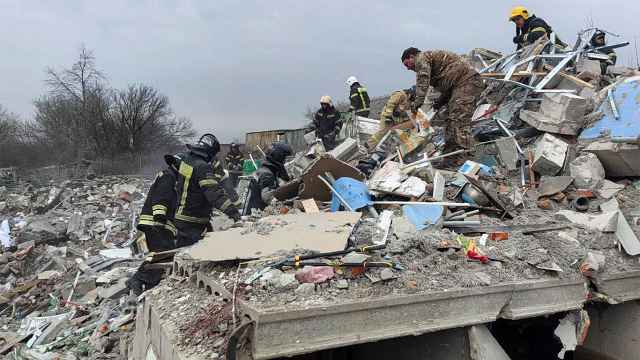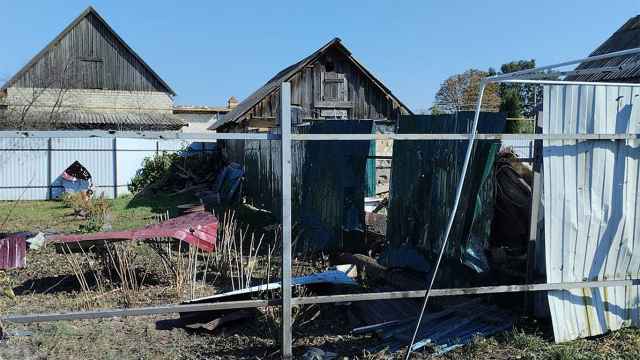Russia said it was evacuating hundreds of children from villages due to intensifying shelling in the border region of Belgorod, where the situation was deemed "alarming" by the Kremlin.
Russia has seen stepped-up attacks on its soil over a year into its Ukraine campaign, with an unprecedented incursion last week in the southern region of Belgorod and a drone attack on Moscow on Tuesday.
"We are starting today to evacuate children from the Shebekino and Graivoron districts," regional Governor Vyacheslav Gladkov said on Telegram, referring to the most affected border areas.
The governor said the first 300 children will be taken to Voronezh, a city around 250 kilometers (155 miles) further into Russia.
A correspondent for state-run agency RIA Novosti near Voronezh said buses had arrived with around 150 people on board.
Gladkov said the situation was "worsening" in the village of Shebekino, where he reported more shelling during the day, but without casualties.
He had posted photos of the aftermath of an early morning strike, with blackened burned cars lying in the grass near a playground, and a rocket that had apparently landed on a road.
"Nobody, thank God, died," Gladkov said, adding that the strike injured four people.
On Tuesday one person was killed and two others were wounded in a Ukrainian strike on a center for displaced people in the region.
The attacks have come as Kyiv says it is preparing for a major offensive against Moscow's forces.
'Alarming' situation
"The situation is quite alarming," Kremlin spokesman Dmitry Peskov said when asked about shelling in the region.
"We have not heard a single word of condemnation from the West so far," Peskov said, adding "measures are being taken."
Several oil depots have been hit in recent weeks.
On Wednesday, authorities in the southern Krasnodar region said a drone hit the Ilsky oil refinery, in an area already hit twice since the beginning of May.
The Kremlin has accused Ukraine — and its Western backers — of being behind the increasing number of reported attacks.
On Tuesday, the Foreign Ministry said the West was "pushing the Ukrainian leadership towards increasingly reckless acts" after a drone attack on residential areas in Moscow.
The Russian Defense Ministry said that eight drones were used in the attack, adding that five of them were downed and three disabled.
At least three buildings were lightly damaged, including two high-rise residential buildings in Moscow's affluent southwest.
Ukraine, which has seen almost nightly attacks on its capital, denied any "direct involvement."
The United States said it did not support any attack on Russian territory and said it was "focused on providing Ukraine with the equipment and training they need to retake their own sovereign territory."
Fatalism in Belgorod
Last week saw the biggest armed incursion into Russia from Ukraine since the offensive began, with two days of fighting in the Belgorod region.
AFP journalists went to the regional capital city, which is also called Belgorod, over the weekend.
Residents confessed to a certain amount of worry, but a sense of fatalism prevailed.
"What can we do? We just shout 'Oh! and 'Ah!'. What will that change?" said retired teacher, 84-year-old Rimma Malieva.
Most people AFP spoke to said they trusted the authorities to fix the weaknesses laid bare by the latest raid.
Evgeny Sheikin, a 41-year-old builder, still said "it should not have happened."
At least five people were killed and 19 wounded in a night bombardment in Ukraine's Luhansk region, Russia-installed officials said Wednesday.
Officials said the strike was carried out using one of the HIMARS multiple launchers delivered to Kyiv by the United States.
The Russian army also said it destroyed a Ukrainian navy warship, the Yuri Olefirenko, in Odesa, a claim AFP could not independently confirm.
Ukrainian naval forces spokesman Oleh Chalyk declined to comment on the claim specifically, but said he "did not recommend paying attention" to Russian sources.
A Message from The Moscow Times:
Dear readers,
We are facing unprecedented challenges. Russia's Prosecutor General's Office has designated The Moscow Times as an "undesirable" organization, criminalizing our work and putting our staff at risk of prosecution. This follows our earlier unjust labeling as a "foreign agent."
These actions are direct attempts to silence independent journalism in Russia. The authorities claim our work "discredits the decisions of the Russian leadership." We see things differently: we strive to provide accurate, unbiased reporting on Russia.
We, the journalists of The Moscow Times, refuse to be silenced. But to continue our work, we need your help.
Your support, no matter how small, makes a world of difference. If you can, please support us monthly starting from just $2. It's quick to set up, and every contribution makes a significant impact.
By supporting The Moscow Times, you're defending open, independent journalism in the face of repression. Thank you for standing with us.
Remind me later.






